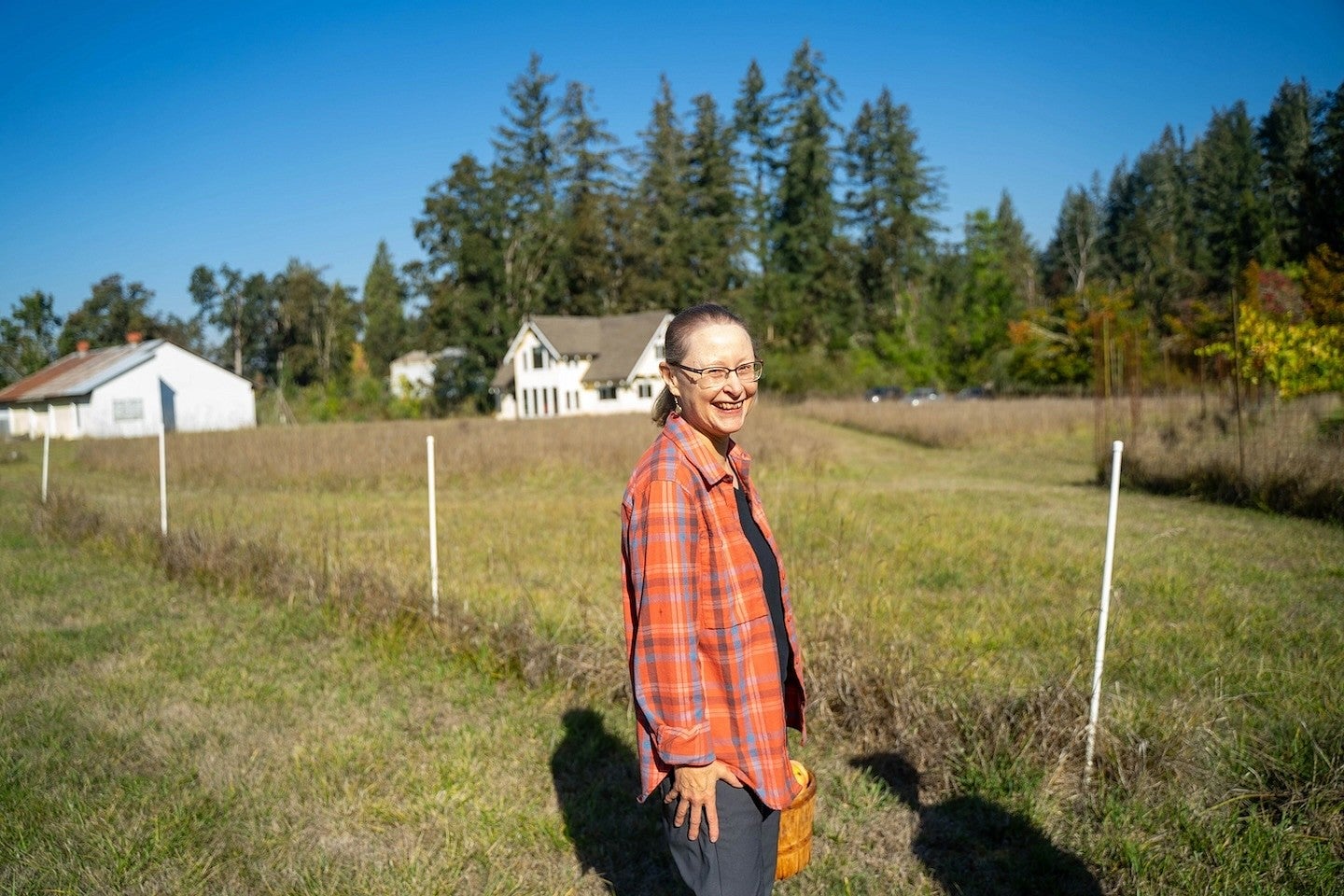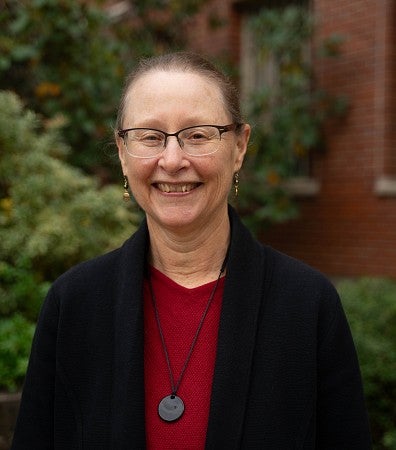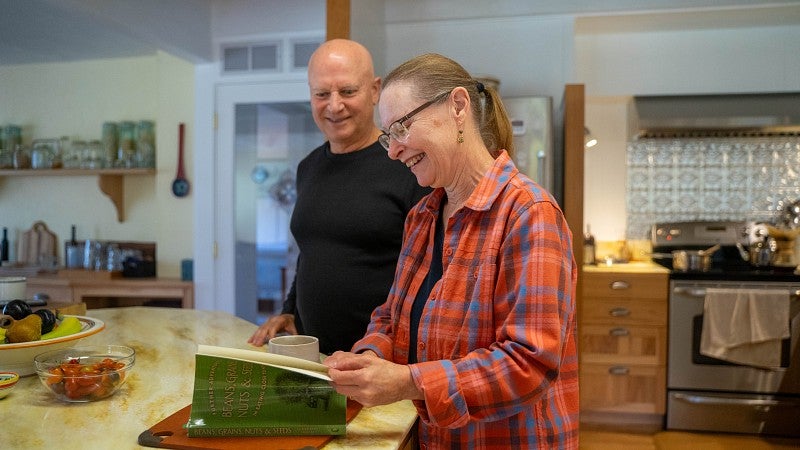
Listen. Learn. Connect.

Hometown: Pleasant Hill, Oregon
Position at CHC: Director of Alumni and Community Engagement
What's in the fridge: Oatmilk, kombucha
Guilty pleasure: Oatmeal scone from New Day Bakery
Plans for retirement: "Doing nothing. And then after a while, more nothing. And then maybe I'll clean the house."
Elin England strolls across her nearly nine-acre property, known in her family as Elkdream Farm. Fall is settling in as dried leaves cover the ground. Bees from a nearby hive trail England, as if drawn to her quiet confidence.
England, the director of alumni and community engagement at the Clark Honors College, lives at Elkdream with her husband of 38 years, Don Schneider. They are the stewards of two dozen apple trees, numerous grapevines, a large kitchen garden, and a full life they’ve made for themselves in the small town of Pleasant Hill – about 10 miles southeast of Eugene.
In her free time, England loves to cook. She’s also authored two cookbooks and has a knack for making recipes with local foods.
At work, she’s a steward of human connection, helping the Honors College keep track of alumni, donors and others who support the burgeoning community. But at the end of 2024, England is retiring from a position she’s held for the last five years.
She considers her decision to be bittersweet. She loves the work, but her parents – who live on two different coasts – are aging. And she also has a lot she wants to do in the future.
If anything, England tries to avoid attention when asked about her accomplishments. Instead, she pushes others toward the spotlight and just goes about her work. She was the chief architect behind the college’s use of CHC Connections, an online platform that helps connect students with alumni around jobs and internships. She’s worked on the CHC Graduation Celebration each year, and she helps keep donors up to speed on the college’s student success efforts.
“I just kept listening and looking for what needed to be done to achieve the desired result, which is a community of alums, family members, donors, and other CHC enthusiasts who feel connected to the college and who have ample opportunity to give back to our wonderful students,” she says.
CHC Dean Carol Stabile calls England an expert collaborator, a model of patient competence, and a fount of knowledge.
“Elin is the kind of person you want to think things through with because in the process of doing so, you'll come up with some ideas and strategies you would never have thought of on your own," Stabile says.
England acknowledges that she’ll miss the work. But as she reflects in the months before her departure, she beamed about the community she helped form and the threads throughout her life that brought her to this point.
This interview was edited for clarity and length.
Take us back to your childhood. You’re the oldest of three kids and grew up on the East Coast. What role did you take on in your family?
I was born in New Hampshire and lived on the East Coast until I was 11. We lived mostly in upstate New York, except for a couple of years in Virginia. I guess I took on a lot of responsibility in the family and the culture of our family. Our summers were always spent on Nantucket Island, where my grandparents lived, and then later we built a cottage there.
You learned how to cook from your mother and grandmother. Are there any specific dishes or memories you have from that time?
It was a little bit of a rarefied culinary experience as I was growing up. The family was always talking about food, thinking about the next meal and talking about past meals. We were all a little bit food obsessed, but in a good way. I remember watching my grandmother cook, and she had this ability to just put things together without looking at a recipe and just eyeballing things. We'd go out to gather wild blueberries and then we'd come back, and she'd just make a pie. I remember watching her and thinking, “God, am I ever going to be able to cook like that?” And the answer is yes, and that's how I cook now. It's just definitely in a creative flow and not much measurement is happening.
You’ve written two cookbooks so far. What was the motivation behind that?
In 2008, I had two kids at home and my husband was working on a study with people who were trying to determine if it would be possible to feed Lane County residents with completely local food. He thought it was possible but many people at that time didn’t know how to cook seasonally. My husband said someone ought to write a book teaching people how to do that. So I decided to write that cookbook. I included recipe ideas from local folks as well as my own recipes and my family’s recipes, and that’s the story behind “Eating Close to Home: A Guide to Local, Seasonal Sustenance in the Pacific Northwest.”
In this video, England talks about the things that she values the most, like family, cooking, and thinking about what she will do in her retirement. She plans to visit each of her parents and then she wants to "do nothing."

England, pictured here with her husband, Don Schneider, has written two cookbooks about local, seasonal eating. Cooking has always been an important part of her life, dating back to a childhood on the East Coast.
I was wondering if you could just touch on a little bit more about how cooking is a way to build interconnectedness and to build community.
It's about feeding people. It’s a way to build connections in present day. But also it connects you to those who came before. I did a lot of cooking using my mom’s and my grandma’s recipes. For a long time, I cooked a lot with recipes that my mom and my grandma used to make, like Swedish smorgasbord for Christmas and the Christmas Day dinner like my mom had done with roast beef and Yorkshire pudding. It does tie you to your family roots.
Before you came to the CHC, you worked at the Oregon Bach Festival for 16 years. What was that like?
It takes all year and then some to plan a festival. But there's definitely an ebb and a flow to it. It was a serious lesson in event planning and management, and thinking way ahead of time how to plan. I was in charge of managing the Stangeland Family Youth Choral Academy. It was a lot of thinking about everybody else's needs and anticipating, you know, what could go wrong here? Oh, we better plan for that. And the beautiful thing was watching what happens when you pull talented high school choral singers together in one group and put them under the direction of an amazing choral director, and you just watch the magic happen. It was just inspiring.
(England turns to her husband and says, “Un po' d'acqua per me, per favore.”)
"Elin is the kind of person you want to think things through with because in the process of doing so, you'll come up with some ideas and strategies you would never have thought of on your own."
What language is that?
We started studying Italian together about 10 years ago and have fun using it together. Some phrases we use so often that they come out automatically, like asking for water.
What responsibilities do you have as the director of alumni and community engagement at the CHC?
It varies so much. At the start of fall term, we have a variety of events happening. I arrange meetings with donors for the dean. I help students write thank you letters to their scholarship donors. I oversee CHC Connections. I write the dean’s monthly message to alumni. I’d define my job as stewardship. Stewardship of donors and alumni, keeping them engaged.
How do you bring that mentality of being a doer into your work at the CHC?
If student success is our main goal, I ask myself: what is it that’s needed to welcome the first-year students when they arrive on campus? What is it that’s needed to support the faculty so that they can do what they need to do? What is it that’s needed to celebrate the graduating class? What is it that’s needed to cultivate a larger community to support the Honors College? And how do we keep alumni engaged and in touch with what we’re doing so that they can give back? How can I be a part of that? How can I help make things work better?
How has your experience working with students at the CHC affected your outlook on life?
Oh, all the students in the Honors College give me so much hope for the future. They go off into the world and do wonderful, wonderful things. And it just gives me so much hope and confidence to see that these beautiful people with excellent minds are going out there. It’s like a forest, you know? You can point to an individual tree in the forest as being the most amazing tree, the biggest, tallest, most beautiful one as far as the eye can see. But that tree is connected to and dependent on all the other living things in the forest community. A tree doesn’t exist apart from the sun, the rain, the wind, the microbial network in the soil, the birds, and all the other critters. Take away or alter any one of those pieces, and the entire forest is affected. The CHC is likewise a living, organic entity, as is the entire UO community. We are all connected.
